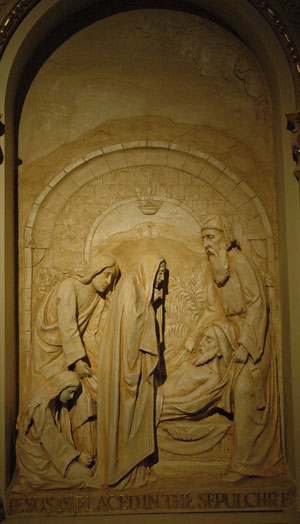Stations of the Cross
Fourteenth Station: Jesus is laid in the tomb
 V/. Adoramus te, Christe, et benedicimus tibi.
V/. Adoramus te, Christe, et benedicimus tibi.
R/. Quia per sanctam crucem tuam redemisti mundum.
From the Gospel according to Matthew 27:59-61
Joseph took the body, and wrapped it in a clean linen shroud, and laid it in his own new tomb, which he had hewn in the rock; and he rolled a great stone to the door of the tomb, and departed. Mary Magdalene and the other Mary were there, sitting opposite the sepulchre.
MEDITATION
Jesus, disgraced and mistreated, is honorably buried in a new tomb. Nicodemus brings a mixture of myrrh and aloes, about a hundred pounds weight, which gives off a precious scent. In the Son’s self-offering, as at his anointing in Bethany, we see an “excess” which evokes God’s generous and superabundant love. God offers himself unstintingly. If God’s measure is superabundance, then we for our part should consider nothing too much for God. This is the teaching of Jesus himself, in the Sermon on the Mount (Mt 5:20). But we should also remember the words of Saint Paul, who says that God “through us spreads the fragrance of the knowledge of Christ everywhere. We are the aroma of Christ” (2 Cor 2:14ff.). Amid the decay of ideologies, our faith needs once more to be the fragrance which returns us to the path of life. At the very moment of his burial, Jesus’ words are fulfilled: “Truly, truly, I say to you, unless a grain of wheat falls to the earth and dies, it remains alone; but if it dies, it bears much fruit” (Jn 12:24). Jesus is the grain of wheat which dies. From that lifeless grain of wheat comes forth the great multiplication of bread which will endure until the end of the world. Jesus is the bread of life which can satisfy superabundantly the hunger of all humanity and provide its deepest nourishment. Through his Cross and Resurrection, the eternal Word of God became flesh and bread for us. The mystery of the Eucharist already shines forth in the burial of Jesus.
PRAYER
Lord Jesus Christ, in your burial you have taken on the death of the grain of wheat. You have become the lifeless grain of wheat which produces abundant fruit for every age and for all eternity. From the tomb shines forth in every generation the promise of the grain of wheat which gives rise to the true manna, the Bread of Life, in which you offer us your very self. The eternal Word, through his Incarnation and death, has become a Word which is close to us: you put yourself into our hands and into our hearts, so that your word can grow within us and bear fruit. Through the death of the grain of wheat you give us yourself, so that we too can dare to lose our life in order to find it, so that we too can trust the promise of the grain of wheat. Help us grow in love and veneration for your Eucharistic mystery – to make you, the Bread of heaven, the source of our life. Help us to become your “fragrance”, and to make known in this world the mysterious traces of your life. Like the grain of wheat which rises from the earth, putting forth its stalk and then its ear, you could not remain enclosed in the tomb: the tomb is empty because he – the Father – “did not abandon you to the nether world, nor let your flesh see corruption” (Acts 2:31; Ps 16:10 LXX). No, you did not see corruption. You have risen, and have made a place for our transfigured flesh in the very heart of God. Help us to rejoice in this hope and bring it joyfully to the world. Help us to become witnesses of your resurrection.
(Meditations and prayer by then-Cardinal Joseph Ratzinger in 2005. For more, see the Vatican website.)
